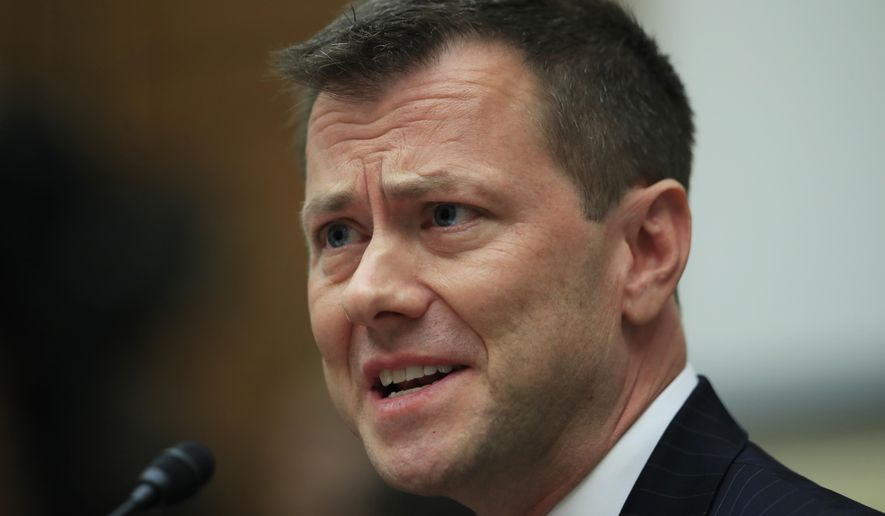One of the most glaringly bogus Trump-Russia stories by The New York Times in 2017 was picked apart inside the FBI at the time as containing over a dozen major inaccuracies, a newly disclosed document shows.
Declassified by the Justice Department, the document contains the Times story that reported there were extensive contacts between the Trump campaign and Russian intelligence. The document also contains a typewritten critique in the margins by FBI Agent Peter Strzok, who totally rejected the Times’ claim.
“Again, we are unaware of ANY Trump advisors engaging in conversations with Russian intelligence officials,” Mr. Strzok wrote.
Since fired by the bureau, Mr. Strzok then led the Crossfire Hurricane unit investigating the Trump campaign.
On Feb. 14, 2017, at the height of conspiracy theories about President Trump and the Kremlin, The New York Times published a three-byline sensation: “Trump Campaign Aides Had Repeated Contacts with Russian Intelligence,” the headline proclaimed.
The first paragraph read, “Phone records and intercepted calls show that members of Donald J. Trump’s 2016 campaign and other Trump associates had repeated contacts with senior Russian intelligence officials in the year before the election, according to four current and former American officials.”
DOCUMENT: Read the debunked New York Times story
The story stood as proof of Trump-Russia collusion except it was flatly wrong. There were no such year’s worth of intercepts or phone records.
Then-FBI Director James B. Comey read the story and quickly, and privately, alerted congressional leaders about the falsity. In June 2017, after being fired by Mr. Trump and testifying before the Senate Select Committee on Intelligence Committee, Mr. Comey told the world the story was false.
Senate Judiciary Committee Chairman Lindsey Graham, South Carolina Republican, released the Strzok document on Friday.
The Times story was a one-two punch at the White House. It came a month after BuzzFeed published the notorious Democratic-funded dossier widely accepted by the press, which erroneously said Mr. Trump was in a far-reaching election conspiracy with Moscow and included numerous salacious details.
“The comments of Peter Strzok regarding the February 14 New York Times article are devastating in that they are an admission that there was no reliable evidence that anyone from the Trump Campaign was working with Russian Intelligence Agencies in any form,” Mr. Graham said.
The senator added, “The statements by Mr. Strzok question the entire premise of the FBI’s investigation of the Trump Campaign and make it even more outrageous that the Mueller team continued this investigation for almost two and a half years. Moreover, the statements by Strzok raise troubling questions as to whether the FBI was impermissibly unmasking and analyzing intelligence gathered on U.S. persons.”
Appointed in May 2017, special counsel Robert Mueller filed a report in March 2019 that said his team found no Trump-Russia election conspiracy.
Mr. Strzok, who was fired for his anti-Trump texts, wrote 15 Times story comments, including:
On the lead paragraph, “This statement is misleading and inaccurate as written. We have not seen evidence of any individuals affiliated with the Trump team in contact with IOs [intelligence officers].”
On the second paragraph, which said U.S. intelligence began collecting Trump-Russia intercepts in the spring, “We do not know nor can we figure out what this means or where it might be coming from (i.e. something we can identify as a source of misunderstanding.)”
On the paragraph that said former campaign manager Paul Manafort was picked up on calls to Russian intelligence, “We are unaware of any calls with any Russian government official in which Manafort was a party.”
On the story saying FBI has banking records, “We do not yet have detailed banking records.”
On they story saying in subsequent paragraphs there were lots of contacts, “Again, we are unaware of ANY Trump advisors engaging in conversations with Russian intelligence officials.”
On The New York Times assertion that the National Security Agency intercepted Russian-Trump aides calls, “If they did we are not aware of those communications.”
Mr. Comey checked with NSA after he read the story and was told there were no such intercepts.
On the story’s assertions that Trump adviser Roger Stone was under investigation at the time, “We have not investigated Roger Stone.”
On the story’s assertion that Christopher Steele, creator of the anti-Trump dossier, was reliable, “Recent interviews and investigation, however, reveal Steele may not be in a position to judge the reliability of his sub-source network.”
By then, the FBI had interviewed Mr. Steele’s main source, who said he fed Kremlin gossip to the British ex-spy and had no idea he was writing a report.
But that’s not the end of the story of the FBI’s skepticism.
According to then-White House chief of staff Reince Priebus, then-FBI Deputy Director Andrew McCabe approached him and volunteered to the president’s top aide that the just-published New York Times story was bunk.
Mr. Priebus asked if he could say that publicly. Later, the FBI told him he could not. The next thing Mr. Priebus knew, CNN was reporting he some how intervened with the FBI to get it to say something that was false. This never happened, he said. He always wondered if the bureau set him up.
• Rowan Scarborough can be reached at rscarborough@washingtontimes.com.




Please read our comment policy before commenting.